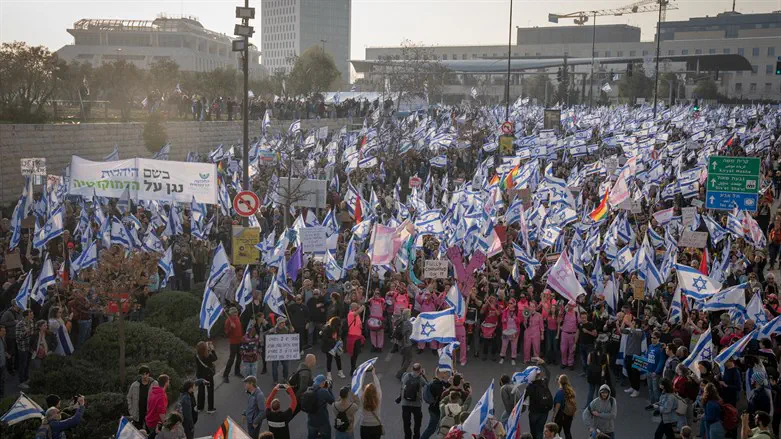
A new survey commissioned by the Israel Democracy Institute (IDI) has revealed a sharp and growing divide between left-wing and self-described centrist voters on the one side, and right-wing voters on the other, as well as a general deterioration in the way Israelis view the country's security and economic situation.
The last such survey was conducted a month ago and the level of confidence in Israel's future as a democratic state has remained steady since, at 38 percent; however, optimism regarding security, both personal and international, has dropped sharply since January, from 46 percent to 31 percent, the second-lowest such figure since surveys including this question began in 2019.
With protests against the government's proposed legal reforms ongoing, the survey found that attitudes toward Israeli democracy differ greatly depending on the side of the political divide. As such, 41 percent of Jews as opposed to 19 percent of Arabs expressed optimism regarding Israeli democracy, but within the Jewish sector, just 7 percent of left-wingers and 19 percent of centrists expressed a similar optimism, contrasted with 61 percent of right-wingers.
When asked about personal and national security, the gaps were still significant but less so. 16 percent of left-wingers and 22 percent of centrists were optimistic; even among right-wingers, the corresponding figure was just 46 percent, a sharp decrease from the previous month.
The results of the survey also contrast sharply with corresponding results five months ago and reveal a huge drop in the public's perception of Israel's condition in general. The number of those categorizing the situation as either bad or extremely bad rose from 30 percent last October to 47 percent in February, while the number of those who said things were "so-so" dropped from 42 to 27 percent over the same period. The number of those who said they thought things were either good or extremely good remained constant at around 25 percent; in other words, many of those who were once non-committal now take a far more pessimistic view of things.
Within the Jewish sector, the number of those who see the current situation as bad or very bad has increased from 28 to 43 percent during the past five months; among the Arab sector, the corresponding figures were 41 and 66 percent. Broken down by political affiliation, the findings once again showed clear gaps between the sides, with those on the right feeling far more upbeat about Israel's situation than those on the left.
The survey also asked respondents for their opinion on the Supreme Court. 44 percent of respondents said that they had confidence in the Supreme Court, a similar figure to that prevailing over the past three years, with little change in opinion either on the left or the right of the political divide.
With regard to participation in ongoing protests against the government's judicial reform program, the number of those who join protests has risen from 13 percent in January to 18.5 percent in February. In the Arab sector, 7 percent replied in January that they participate in protests; by February this number had risen to 14 percent. Within the Jewish sector, the corresponding figures were 15 and 19 percent.
Unsurprisingly, most of those participating in the protests are either on the left-wing or in the center, with 45.5 percent of people in the Jewish sector who attend protests defining themselves as left-wing, 37.5 as centrist, and 17 percent as right-wing.
Around 21 percent of those surveyed said that in certain circumstances, the use of violent means to attain specific goals was legitimate in their eyes. Among those who have participated in recent protests, a large majority was in favor of all manner of protest actions excepting refusal to report for reserve duty and to pay taxes (which enjoy the support of a small but significant minority). Among those who have not participated in protests, most support the right to do so and more than half also support the right to go on strike in protest, but only a small minority support refusing to report for reserve duty or to pay taxes.
Despite the increase in the number of people joining protests, optimism regarding their effectiveness has dropped.
The survey also asked respondents for their view of the current government as compared to the previous one, and found that just 44 percent of respondents thought that security and the economy had improved. 41 percent of respondents said they thought things had improved in the diplomatic arena, while just 19 percent thought that the situation prevailing between the various components of Israeli society had improved.
Meanwhile, with Ramadan approaching, 60 percent of respondents said that they feared that either they or their family members could be caught up in a terrorist attack, with little difference seen between the Arab and Jewish sectors (56 and 61 percent respectively). Those living in Judea and Samaria were the most concerned for personal security (73 percent) with the lowest figures seen in Jerusalem where concern was still high at 52 percent.
